|
|
|
Sort Order |
|
|
|
Items / Page
|
|
|
|
|
|
|
| Srl | Item |
| 1 |
ID:
113173
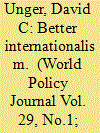

|
|
|
|
|
| Publication |
2012.
|
| Summary/Abstract |
Genoa-Internationalism has many different meanings, but constructive global citizenship should always be at its core. An internationalist foreign policy for the developed countries would use their wealth, economic might, and military power to promote a better, more peaceful, more prosperous world for everyone.
|
|
|
|
|
|
|
|
|
|
|
|
|
|
|
|
| 2 |
ID:
113170
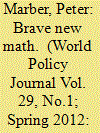

|
|
|
|
|
| Publication |
2012.
|
| Summary/Abstract |
In 1968, at age 56, my grandfather had a heart attack. It surprised a lot of people. With a full head of hair, he was thin, youthful looking, and rarely sick. He received standard patient treatment for the time-prolonged bed rest and morphine. When he recovered, he continued his pre-attack lifestyle which included smoking, almost no exercise, and a diet of meat, potatoes, and my grandmother's cream pastries. Five years later, he was dead, the result of another heart attack.
|
|
|
|
|
|
|
|
|
|
|
|
|
|
|
|
| 3 |
ID:
113168
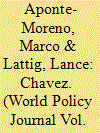

|
|
|
|
|
| Publication |
2012.
|
| Summary/Abstract |
Caracas-Last July, when Venezuelan President Hugo Chávez was being treated for an undisclosed type of cancer, he announced on his 57th birthday that he had changed the slogan defining his Bolivarian Revolution. Until then, soldiers were required to salute their superiors with "Motherland, socialism, or death." Standing next to his daughters on the balcony of the Miraflores Palace, the president's official workplace in Caracas, and wearing a yellow shirt instead of his trademark red, he proclaimed, "We have to live, and we have to come out victorious. That's why I propose a new slogan. There's no death here. There's life." Then thrusting his left fist into the air, he shouted, "Socialist motherland and victory, we will live, and we will come out victorious." His followers responded to the new salute with a mass ovation.
|
|
|
|
|
|
|
|
|
|
|
|
|
|
|
|
| 4 |
ID:
113171
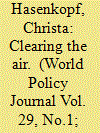

|
|
|
|
|
| Publication |
2012.
|
| Summary/Abstract |
Ulaanbaatar, Mongolia-As the sun rises over the frozen steppes, mothers and grandmothers across Mongolia emerge from their homes-white, felt-covered, round tents called gers. Hands hidden from the cold in the long sleeves of their warm deels, they clutch a ladle in one hand and an urn of milk tea in the other. Offering tsainii deej urguh, they throw a ladle-full of milk tea into the sky to honor the heavens. For many Mongolian women, the view is of blue sky and the open steppe, the horizon perhaps dotted with their family's herd of goats and sheep. But for those who live within sight of the capital, the panorama is quite different. Before them lies a vast city, home to more than a million people, jammed into an urban sprawl of closely packed gers, Soviet-era apartments, and new high-rises. Yet in the heart of the Mongolian winter, they can see none of this. Instead, a thick, gray layer of pollution obscures the horizon. Ulaanbaatar, capital of the most sparsely populated country on the planet and renowned for its pristine countryside and nomadic herdsmen, has some of the world's most toxic air.
|
|
|
|
|
|
|
|
|
|
|
|
|
|
|
|
| 5 |
ID:
113174
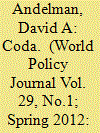

|
|
|
|
|
| Publication |
2012.
|
| Summary/Abstract |
PARIS-We are eight at a long, leisurely lunch in the charming 14th arrondissement apartment just off the Place Denfert-Rocherot. Our host is a Le Monde journalist whose long career has taken him from Cambodia in the last days of the Indochina wars and the killing fields of the Khmer Rouge to John Major's London and to Washington, straddling Clinton and Bush. The afternoon begins with a fabulous hard yellow cheese and a rich white wine from Catalonia down by the Pyrenees separating France from Spain where our hosts have their country cabin. The dishes are passed around, the wine glasses filled and refilled, the main course, a succulent cassoulet de canard and all the trimmings. But the centerpiece, as is the case these days when any two or more Europeans gather, is the Presidentielles-the national elections for the first new President de la Republique in five years. The first round will be held in just 11 weeks. This watershed vote comes amidst another downward spiral in a French economy already battered by the three-year global recession. These two all but inseparable subjects, fused into a complexity only the French can master, continue to mesmerize this nation that, even in the best of times, never takes its politics in stride.
|
|
|
|
|
|
|
|
|
|
|
|
|
|
|
|
| 6 |
ID:
113169


|
|
|
|
|
| Publication |
2012.
|
| Summary/Abstract |
BRUSSELS-In a detailed three-page memo published nearly two decades ago, an unnamed European Union official set about codifying just what constitutes a good banana. Few could have predicted that "Commission Regulation (EC) No 2257/94 of 16 September 1994 laying down quality standards for bananas" would ever attract much outside attention. Even by the lexicon of regulatory documents, it is a turgid read. It lays down technical specifications for fruit imported or grown in the EU: their size ("minimum 14 cm"), how their crown is cut ("not beveled or torn") and their shape ("free from abnormal curvature"). The blameless Eurocrat behind it could not have guessed that his proposals, which became law the following year, would morph into a cause célèbre among detractors of the European Union.
|
|
|
|
|
|
|
|
|
|
|
|
|
|
|
|
| 7 |
ID:
113166
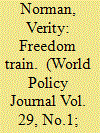

|
|
|
| 8 |
ID:
113172
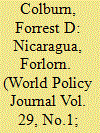

|
|
|
|
|
| Publication |
2012.
|
| Summary/Abstract |
Managua-There are few visible signs that Nicaragua had a traumatic Revolution 30 years ago. The ever-present soldiers with their AK-47s are gone, along with their jeeps and trucks. Gone, too, are the billboards, posters, murals, and graffiti with the revolutionary exhortations of the Sandinistas. The newspaper Barricada (Barricade) has vanished and so have the plethora of magazines, pamphlets, and books devoted to political and economic change. More noticeable, Nicaraguans are relaxed, at ease. There is no "mobilization," little talk of politics, and no expectation of imminent change. There is no sense, either, of danger.
|
|
|
|
|
|
|
|
|
|
|
|
|
|
|
|
| 9 |
ID:
113167


|
|
|
|
|
| Publication |
2012.
|
| Summary/Abstract |
Istanbul-Hasibe Koyun has her first German class in Istanbul on a crisp January morning. She's so nervous that her hand, where she wears her large diamond engagement ring, quivers. When she introduces herself to the class, she twirls the ring around her finger and glances at the whiteboard, where the teacher has written the German words for "I'm called," Ich heiße. Koyun's cheeks turn red. "Ich hei-zze Hasibe," she stammers with a thick beginner's accent. For 23-year-old Koyun, these first words of German, spoken at the Goethe Institute in Istanbul, mark the beginning of an odyssey that will, she hopes, take her from her hometown of Ören-a tranquil village of 1,500 in Turkey's western Anatolia-to Germany, where she plans to join her new husband, Ilhan, in the Rhineland city of Düsseldorf.
|
|
|
|
|
|
|
|
|
|
|
|
|
|
|
|
| 10 |
ID:
113165


|
|
|
|
|
| Publication |
2012.
|
| Summary/Abstract |
Among friends and fans at his boozy 29th birthday party in March 2010, the South African youth leader Julius Malema cocked his right thumb, pointed his finger like a pistol and chanted "Dubulu iBhunu" (shoot the Boer). The crowd sang along merrily.
Malema sang Dubulu iBhunu again a few days later at a rally at the University of Johannesburg, but this time it was aired on television and translated into Afrikaans, in which 'Boer' originally meant 'farmer' and is now a derogatory term for Afrikaner. Hundreds of agitated whites filed formal protests and a judge ordered Malema to stop singing Dubulu iBhunu until the matter could be decided in court. He went on anyway, saying he was only preserving an old anthem from the anti-apartheid struggle-a piece of cultural heritage not to be taken literally. He was singing about the Afrikaner-designed apartheid system, he said, not encouraging his listeners to shoot people.
|
|
|
|
|
|
|
|
|
|
|
|
|
|
|
|
|
|
|
|
|